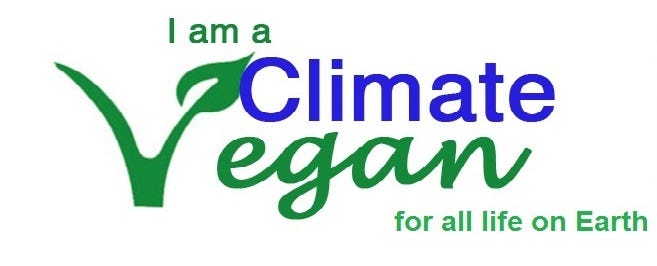Go Vegan Because Karma in Beef
Vegans accept been talking about 'karma' a lot lately, with reference to the Nepal earthquake in particular. It might be useful to consider what 'karma' ways, particularly in a Buddhist context, because it has useful implications for the movement. Karma is generally explained by Buddhist teachers quite only as "cause-and-event." Or simpler nevertheless, as "action" or merely "intention." Prior to the Buddha's teachings, one's deportment were thought to be the determinants of one'southward hereafter well being. According to these teachings, every bit long as you performed certain religious rituals, you would receive the benefits of those deportment. The Buddha refined and corrected this view by maxim that is not really the activeness, but the intention behind the action that gives ascension to 'karma.'
The fruits of interim on the intention are automated. Rewards and punishments are not meted out past a deity. It might not be clear to us the way in which karma works. It might piece of work immediately, as in the trivial niggling uneasy feeling we get when we are being less than generous. Or, it might take years. According to Buddhism, karma doesn't even have to deport fruit in this lifetime, considering you lot may feel the results of karma in any number of futurity rebirths. And because Buddhism recognizes 'anatta' or not-cocky, nosotros don't really know 'who' will be one to experience the results of the good and bad karma we engender during our ain lifetimes. It gets pretty complicated, and this is why the Buddha said that if nosotros endeavour to empathise karma our heads will break into 7 pieces. So, all-time to focus our intentions skilfully on pity and wisdom rather than endeavor to fathom karma.
The Buddha did non say that everything that everything that happens to the states is a event of past karma. If you happen to exist in a natural disaster, for example, that could merely be due to other causes than your past karma. Gil Fronsdal explained it as a safe duck in a pond.
" We live in a bounding main of crusade and result. I like the word sea because, if you have a pond, and you lot throw a whole bunch of pebbles into the pond, you create wave patterns that ripple out in all directions.

If you put a rubber duck in the pond earlier you throw all those pebbles in, which pebble is affecting the duck, making it bob upwards and down? They all are, and they all are in this complicated way by which the pebbles and the waves are interacting on the surface of the h2o. In the same way, in this life of ours, we alive in this big sea of cause and event. The ripples of crusade and effect and the way in which all these ripples impact each other in turn touch on us. We are like ducks."
The stumbling cake for a lot of people is in understanding that karma, at to the lowest degree in the Buddhist's view, is non really a mechanism for meting out justice, and that it definitely isn't payback. Just information technology seems that humans have strong need for retributive justice, a demand to punish incorrect-doing. And so nosotros often say that someone getting their comeuppance is the result of karma. But Buddhism argues against acting through anger, and wishing or intending retribution, considering this is some other fashion in which nosotros hurt ourselves.
So if karma is not a vengeful god or a godlike beingness, then what is information technology? If it is non penalty and retribution, and then what is information technology? I realized that I have been thinking of karma like it is some kind of negative feedback loop, that if things motion too far from a set betoken there will be corrective mechanisms. I take probably been influenced by scholars such equally Thanissaro Bhikku who also talk most feedback loops.
" Buddhists, still, saw that karma acts in multiple feedback loops, with the present moment being shaped both by by and by present actions…there is gratis will, although its range is somewhat dictated by the past. The nature of this freedom is symbolized in an paradigm used by the early Buddhists: flowing water. Sometimes the flow from the past is so strong that little can be washed except to stand fast, only there are too times when the menstruation is gentle enough to be diverted in well-nigh any direction."
What karma might be
Equally we accept learned from several scientific articles, position papers, from the book Comfortably Unaware, and the documentary Cowspiracy, the leading correspondent to climate disruption and ecology destruction is animal agriculture. Plunder the world for meat and dairy, and suffer the consequences of actions in the anticipated floods, famines, droughts, disease, and war. Greenhouse gases, fresh water pollution, ocean dead zones, air pollution, rainforest destruction; air, h2o, earth all polluted, defiled and spent because of addiction to meat and dairy. Now this really does sound like a religious narrative — indulge your roughshod addictions, and exist subject to devastation yourself. If you sin, then you will be punished.
There are ii things to note here though. First, the karmic furnishings do not necessarily restrict themselves to those who sinned. Both young children and other animals who did non intentionally contribute to the ecology degradation will also suffer the consequences. So those of us looking for retribution will get more than than we bargained for. It doesn't make sense to retrieve of it every bit sin and punishment, or vengeful payback. It is what information technology is, cause and outcome. If we continue to appoint in animal farming we will dramatically accelerate climate disruption effects.
Second, annotation that the climate effects are a direct result of fauna exploitation for food, just not a result of all types of animal exploitation — clothing, the amusement industry, and vivisection. In a narrow sense of cause-and-effect, none of the other uses of animals is responsible for the massive calibration of devastation wrought by eating animals. They might have their own karmic loops. Or y'all could argue that in the broader sense all animal uses reinforce the wrong thought that sentient beings are commodifiable.
What it probably isn't
Nepal has only been devastated by an environmental catastrophe of its own, the vii.8 earthquake. Several thousand humans were killed, many more injured, and we might surmise, at least every bit many other animals were afflicted.
Many of united states, particularly vegans, were outraged at Nepal'due south Gadhimai festival a few months ago, where 300,000 animals were hacked to death in a sacrificial rite. The obvious religious connexion made the killing seem much more "unnecessary" than the killing of animals for food in the west. Vegans and non-vegans alike chosen out this event equally "outdated thinking."
Notation, we practice kill animals for religious purposes hither in the west, lambs for Easter, turkey for Christmas come to listen, non to mention the animals killed for nonreligious celebrations (Thanksgiving Turkey, Fourth of July Cookouts). Merely because non-vegans consider that "necessary" killing they are not met with the aforementioned outrage.
Unfortunately though, the ii events, the ritual killing and the earthquake, take been linked together as a karmic cause-and-effect, that the earthquake is the payback for killing animals. This clearly smacks of revenge-taking by vegans and peradventure some non-vegans likewise. There is no cause-effect connection between the slaughter of cows in Gadhimai and the convulsion. To say that the earthquake is 'karma' is engaging in the aforementioned type of thinking that we objected to in the first place when the Nepalese sacrificed animals for to the goddess Gadhimai for the sake of achieving prosperity.
In either example, whether it is sacrifice and prosperity, or cede and earthquake, nosotros have no reason to believe in that location is a causal relationship.
The Climate Connectedness
I don't argue that Buddhists have all the answers. For one, they are not beyond evoking crusade-result connections that we have no scientific proof for. For example, praying or wishing well for others has positive psychological benefits for the united states of america, and this has been shown in scientific studies. But Buddhists believe that metta volition accept some positive issue in the world aside from the effects it has on our own mental well being, and we do non have any evidence of that.
We might not understand karma but nosotros practise understand that causes have effects. The connection between eating animals and impending climate ending is clear. We also empathise that wishing for retribution, revenge and payback hurts us right now, but like holding a hot coal to throw at someone else hurts us.
If at that place is any utilise for 'karma' other than revenge-taking and spurious causal arguments, it is that information technology connects us with archetypal narrative that makes firsthand sense to anybody. I often end upward supporting my creature rights views with climate arguments. People can't connect with animals, probably because our tradition and our experience force us to turn a blind heart. Nearly people tin't encounter by our routine exploitation of not-humans. With some deft turns in the statement to focus on environmental furnishings, I can get some concessions, sometimes.
Furthermore, it seems that the climate argument for omitting animal products from our diet is advanced by those who are vegan already for animal liberation. It seems that it is hard for people to go vegan for the planet. Even the 'climate vegans' are people who are animal rights vegans who spread awareness well-nigh the result of beast agriculture on the surroundings.

Let'south non confuse the true causal argument with the spurious ones. The observable effects of eating animals are merely likewise obvious to compromise.
Source: https://ramaganesan.medium.com/veganism-and-karma-916d8f966597
Post a Comment for "Go Vegan Because Karma in Beef"